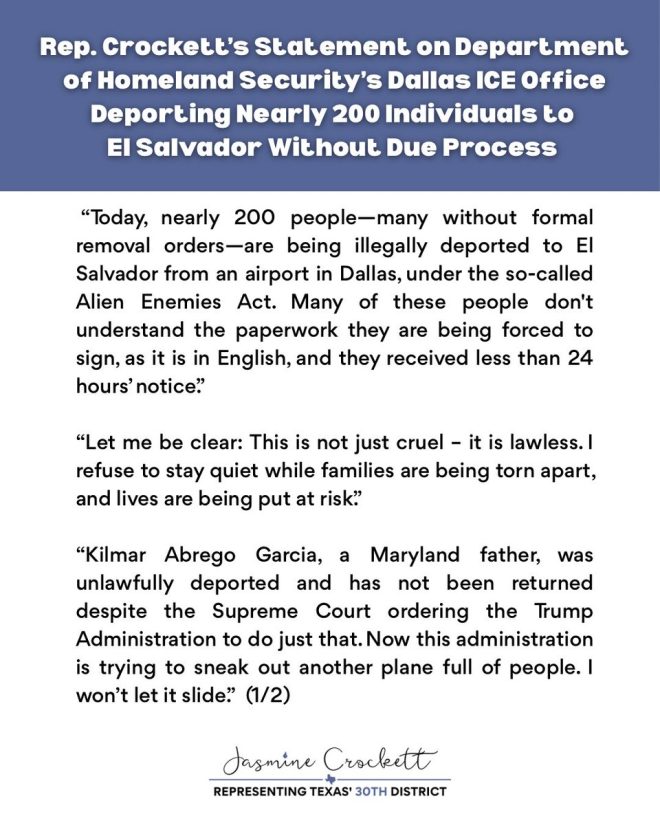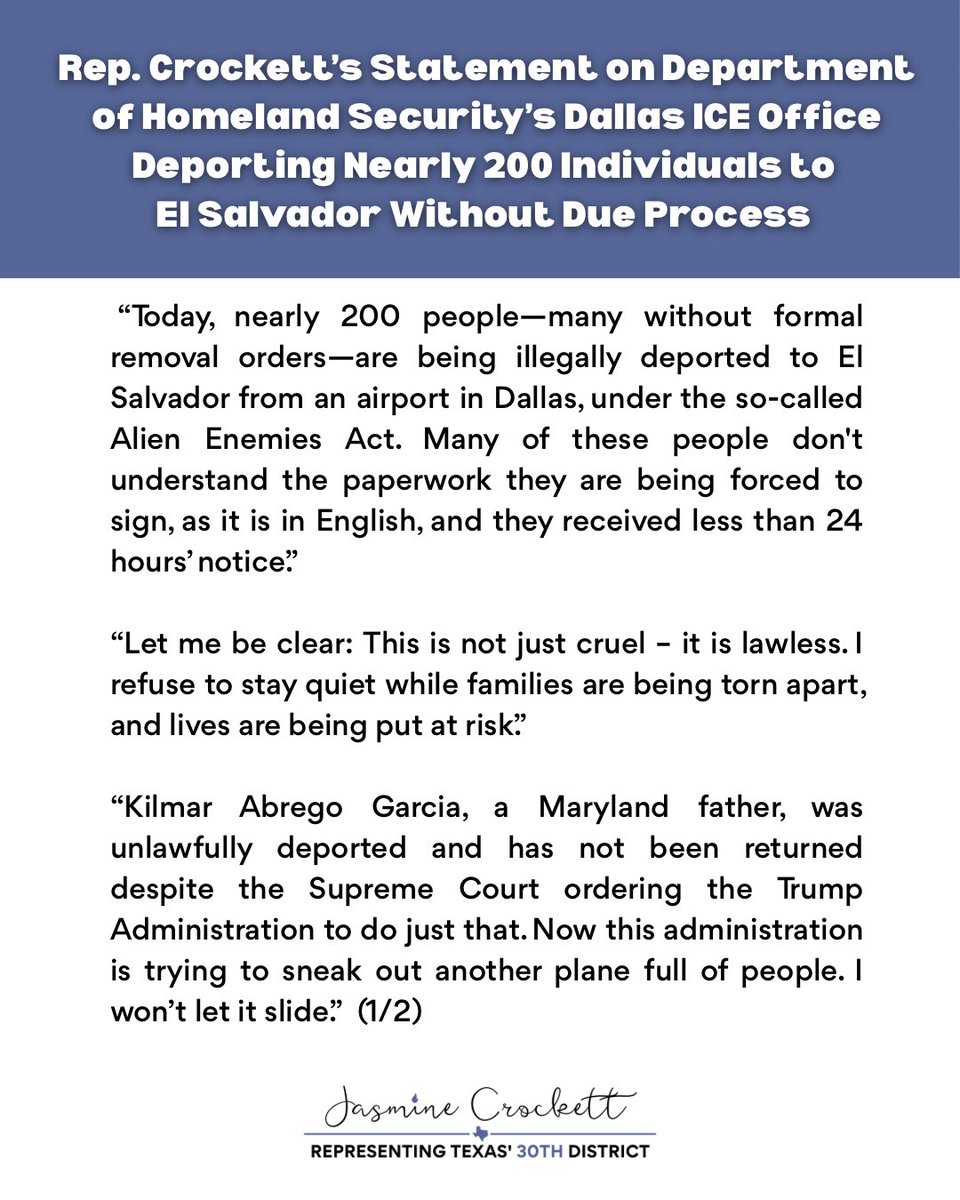
Mass deportation Efforts by Dallas ICE Office: A Controversial Action
On April 18, 2025, Congresswoman Jasmine Crockett publicly condemned the Dallas Immigration and Customs Enforcement (ICE) office’s mass removal initiative targeting nearly 200 individuals, many of whom reportedly lack removal orders. This controversial operation aims to deport these individuals to El Salvador, raising significant concerns about the legality and morality of such actions. In her statement, Rep. Crockett described the operation as not just cruel, but also lawless, emphasizing the emotional toll on families and communities affected by these enforcement measures.
Background of ICE Operations
Immigration and Customs Enforcement (ICE) is a federal agency responsible for enforcing immigration laws in the United States. The agency often faces scrutiny for its deportation practices, especially concerning individuals who may have deep ties to their communities or who are fleeing violence in their home countries. The Dallas ICE office’s recent initiative is part of a broader trend of increased immigration enforcement across the nation, which has sparked debates about human rights and the ethical implications of such actions.
Impact on Families
The mass removal effort has raised alarms about the potential heartbreak for families. Many of the individuals targeted may have established lives in the U.S., contributing to their communities and supporting families. Rep. Crockett’s statement underscores the profound impact such deportations have on family unity and mental health. The prospect of separating parents from children or spouses from partners creates a ripple effect that can lead to long-term emotional and financial instability for those left behind.
- YOU MAY ALSO LIKE TO WATCH THIS TRENDING STORY ON YOUTUBE. Waverly Hills Hospital's Horror Story: The Most Haunted Room 502
Legal and Human Rights Concerns
Critics of ICE’s actions argue that many individuals being targeted for removal lack proper due process. The concerns are exacerbated when individuals without removal orders face deportation, questioning the legality of the enforcement measures. Rep. Crockett’s assertion that the operation is "lawless" reflects a growing sentiment among advocates and legal experts who argue that due process must be upheld in immigration proceedings.
The human rights implications of mass deportations are significant. Organizations advocating for immigrant rights have long pointed out that such operations can lead to violations of basic human rights, including the right to family life and the right to seek asylum. The potential for wrongful deportations raises ethical questions about the U.S. immigration system and its adherence to international human rights standards.
Community Response
In response to the mass removal effort, community organizations and advocates have mobilized to support those at risk of deportation. Many groups are providing legal assistance, resources, and emotional support to affected families. Advocacy efforts aim to raise awareness about the implications of such ICE operations and to push for reforms in immigration policy that prioritize humane treatment and due process.
Public outcry, as demonstrated by Rep. Crockett’s tweet, reflects a growing resistance to aggressive immigration enforcement tactics. Activists and community leaders are calling for policy changes that ensure protections for vulnerable populations and promote pathways to legal status rather than punitive measures.
The Broader Context of Immigration Reform
The Dallas ICE operation highlights the urgent need for comprehensive immigration reform in the United States. As debates about border security and immigration policy continue to evolve, the experiences of individuals facing deportation must remain at the forefront of these discussions. Advocates argue for a system that prioritizes compassion, fairness, and respect for human rights, rather than one driven by fear and enforcement.
Comprehensive immigration reform should focus on pathways to citizenship for undocumented individuals, protections for asylum seekers, and alternatives to detention. Such measures would not only strengthen families and communities but also promote economic stability and social cohesion.
Conclusion
The mass removal effort by the Dallas ICE office represents a critical moment in the ongoing discourse around immigration enforcement in the United States. Congresswoman Jasmine Crockett’s vocal opposition underscores the ethical and legal ramifications of such actions, emphasizing the need for a more humane approach to immigration policy. As communities rally to support those affected and advocate for change, the call for reform remains strong. The future of U.S. immigration policy must reflect a commitment to justice, family unity, and respect for human dignity, ensuring that the rights of all individuals are upheld and protected.
In summary, the concerns raised by the Dallas ICE office’s actions resonate deeply within the broader conversation about immigration reform, human rights, and the need for a compassionate approach to those seeking safety and security in the United States. The ongoing dialogue surrounding these issues is crucial for fostering a more inclusive and just society for all.

The Dallas ICE office is involved in a mass removal effort targeting nearly 200 people — many without removal orders — scheduled to be deported to El Salvador today.
This is not just cruel – it is lawless. I refuse to stay quiet while families are being torn apart, and lives… pic.twitter.com/CiSv0I1CBj
— Congresswoman Jasmine Crockett (@RepJasmine) April 18, 2025
The Dallas ICE Office is Involved in a Mass Removal Effort Targeting Nearly 200 People
Recently, the Dallas ICE office has been at the center of a significant controversy involving a mass removal effort aimed at nearly 200 individuals. Many of these people lack removal orders, raising serious concerns about the legality and morality of the actions being taken. The scheduled deportation of these individuals back to El Salvador has sparked outrage among advocates, politicians, and communities alike. The sheer number of people targeted in this effort has left many questioning the motivations and implications of such a widespread operation.
Understanding the Context Behind the Removal Effort
The situation is complex and deeply rooted in the larger issues surrounding immigration policy in the United States. ICE, or Immigration and Customs Enforcement, is responsible for enforcing immigration laws. However, the methods employed by ICE have often been criticized as overly aggressive and, in some cases, in violation of basic human rights. In this instance, the lack of removal orders for many individuals highlights a troubling trend where families are being separated, often without any clear legal justification.
This is Not Just Cruel – It is Lawless
Congresswoman Jasmine Crockett, who has been vocal about her opposition to these actions, emphasizes that this situation is not merely a matter of policy but one of fundamental justice. She points out that the actions taken by the Dallas ICE office are not only cruel but also lawless. By targeting individuals without removal orders, the agency appears to be acting outside the bounds of lawful immigration enforcement. The implications of such actions are far-reaching, affecting not only the individuals being targeted but also their families and communities.
The Impact on Families and Communities
As the deportation efforts unfold, the emotional toll on families is immense. Many of those being targeted have lived in the U.S. for years, contributing to their communities and building lives. The prospect of being forcibly removed from their homes to a country that may not feel like home anymore is devastating. Families are torn apart, children are left without parents, and the ripple effects of these actions can be felt throughout communities. It’s a heartbreaking reality that many are grappling with as they learn about the mass removal efforts.
Voices of Opposition
The outcry against these deportations has been growing, with various advocacy groups stepping up to defend the rights of those affected. Organizations that focus on immigration rights are mobilizing to provide legal assistance and support for the individuals facing deportation. People from all walks of life are joining the conversation, pushing back against what they see as inhumane treatment of people seeking a better life. The sentiment is clear: many refuse to stay quiet while families are being torn apart and lives are being disrupted.
Legal Ramifications of the Removal Efforts
The legal questions surrounding these mass removals are significant. Immigration law is incredibly complex, and the actions of the Dallas ICE office may violate various legal standards. Advocacy groups argue that deporting individuals without proper orders undermines the rule of law and sets a dangerous precedent for future immigration enforcement. The concept of due process is at stake, and many are calling for a reevaluation of how ICE operates in situations like this.
Community Responses and Mobilization
As news of the mass removal efforts spreads, communities have begun to organize in response. Town hall meetings, rallies, and social media campaigns are just a few of the ways that people are coming together to voice their concerns. Community members are sharing stories, raising awareness, and advocating for policy changes that prioritize humane treatment of all individuals, regardless of their immigration status. This grassroots mobilization is crucial in the fight for justice and reform.
The Role of Social Media in Advocacy
Social media platforms have become vital tools for advocacy, allowing individuals to share their stories and raise awareness about the ongoing situation. Congresswoman Crockett’s tweet, which highlighted the mass removal efforts, is just one example of how lawmakers can use their platforms to shed light on pressing issues. The viral nature of social media means that information spreads rapidly, mobilizing support and bringing attention to issues that might otherwise remain in the shadows.
Looking Forward: The Future of Immigration Policy
The events surrounding the Dallas ICE office’s mass removal efforts may prompt a broader discussion about immigration policy in the United States. Advocates for reform are emphasizing the need for a more compassionate approach that considers the human side of immigration. The focus should be on finding solutions that protect families and communities rather than tearing them apart. As conversations continue, it’s essential that lawmakers and advocates work together to create policies that reflect the values of justice and humanity.
Conclusion: Standing Up for Justice
This situation in Dallas is a stark reminder of the complexities surrounding immigration enforcement and the urgent need for reform. It is not just about laws; it is about people—families, children, and communities that are affected by the decisions made by those in power. As we navigate these challenging times, it is crucial to remain informed, engaged, and committed to advocating for justice and humane treatment for all individuals, regardless of their immigration status.
Breaking News, Cause of death, Obituary, Today
